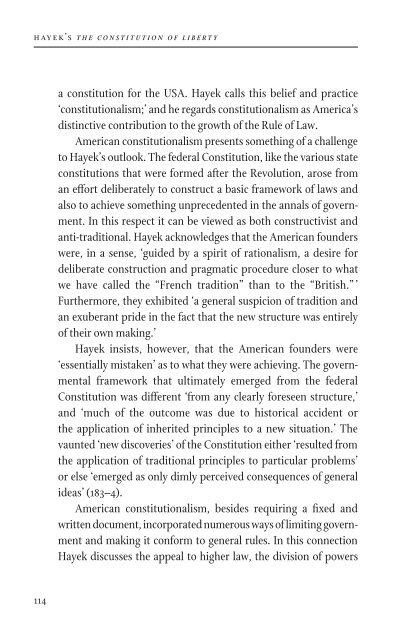Hayek's The Constitution of Liberty - Institute of Economic Affairs
Hayek's The Constitution of Liberty - Institute of Economic Affairs
Hayek's The Constitution of Liberty - Institute of Economic Affairs
You also want an ePaper? Increase the reach of your titles
YUMPU automatically turns print PDFs into web optimized ePapers that Google loves.
h ay e k ’ s t h e c o n s t i t u t i o n o f l i b e r t y<br />
o r i g i n s a n d d e v e l o p m e n t o f t h e r u l e o f l aw<br />
a constitution for the USA. Hayek calls this belief and practice<br />
‘constitutionalism;’ and he regards constitutionalism as America’s<br />
distinctive contribution to the growth <strong>of</strong> the Rule <strong>of</strong> Law.<br />
American constitutionalism presents something <strong>of</strong> a challenge<br />
to Hayek’s outlook. <strong>The</strong> federal <strong>Constitution</strong>, like the various state<br />
constitutions that were formed after the Revolution, arose from<br />
an effort deliberately to construct a basic framework <strong>of</strong> laws and<br />
also to achieve something unprecedented in the annals <strong>of</strong> government.<br />
In this respect it can be viewed as both constructivist and<br />
anti-traditional. Hayek acknowledges that the American founders<br />
were, in a sense, ‘guided by a spirit <strong>of</strong> rationalism, a desire for<br />
deliberate construction and pragmatic procedure closer to what<br />
we have called the “French tradition” than to the “British.” ’<br />
Furthermore, they exhibited ‘a general suspicion <strong>of</strong> tradition and<br />
an exuberant pride in the fact that the new structure was entirely<br />
<strong>of</strong> their own making.’<br />
Hayek insists, however, that the American founders were<br />
‘essentially mistaken’ as to what they were achieving. <strong>The</strong> governmental<br />
framework that ultimately emerged from the federal<br />
<strong>Constitution</strong> was different ‘from any clearly foreseen structure,’<br />
and ‘much <strong>of</strong> the outcome was due to historical accident or<br />
the application <strong>of</strong> inherited principles to a new situation.’ <strong>The</strong><br />
vaunted ‘new discoveries’ <strong>of</strong> the <strong>Constitution</strong> either ‘resulted from<br />
the application <strong>of</strong> traditional principles to particular problems’<br />
or else ‘emerged as only dimly perceived consequences <strong>of</strong> general<br />
ideas’ (183–4).<br />
American constitutionalism, besides requiring a fixed and<br />
written document, incorporated numerous ways <strong>of</strong> limiting government<br />
and making it conform to general rules. In this connection<br />
Hayek discusses the appeal to higher law, the division <strong>of</strong> powers<br />
both among the branches <strong>of</strong> the federal government and between<br />
government and the states, the insistence on the inviolable rights<br />
<strong>of</strong> individuals, and the practice <strong>of</strong> judicial review. A thread running<br />
through the entire discussion is the problem <strong>of</strong> how, in popular<br />
government, majorities can be kept within safe limits.<br />
<strong>The</strong> Americans were much more concerned than the English<br />
had been with limiting the power <strong>of</strong> representative legislatures.<br />
Partly this was because the colonists, in the decade leading up to<br />
the Revolution, had been forced to resist Parliament’s claim to<br />
power over them; but more fundamentally it reflected awareness<br />
that, in a democratic society, majority rule could endanger liberty.<br />
<strong>The</strong> newly formed state legislatures were frequently criticised at<br />
the time for exceeding their proper powers.<br />
Americans embraced the long-standing view that ordinary<br />
legislation must conform to a ‘higher law;’ and they insisted on<br />
codifying higher law principles in a written document, so as to<br />
make them explicit and enforceable. This means that particular<br />
laws enacted by the legislature are just only if they conform to<br />
principles embodied in the <strong>Constitution</strong>. Requiring conformity to<br />
general principles deters the legislature from sacrificing long-term<br />
advantages to immediate aims and from conferring privileges or<br />
imposing penalties on individuals (179–80).<br />
Hayek’s view <strong>of</strong> higher law differs substantially from the way<br />
the Americans themselves understood it. By his interpretation,<br />
higher law is not rooted in divine will, or nature, or reason, as<br />
Americans had generally believed. Hayek reminds us that reason<br />
always ‘moves within a non-rational framework <strong>of</strong> beliefs and<br />
institutions.’ Higher law, for any society, consists <strong>of</strong> principles<br />
implicit in prevailing beliefs and opinions. <strong>The</strong> decisive consideration<br />
is whether a people, regardless <strong>of</strong> how they understand the<br />
114<br />
115












